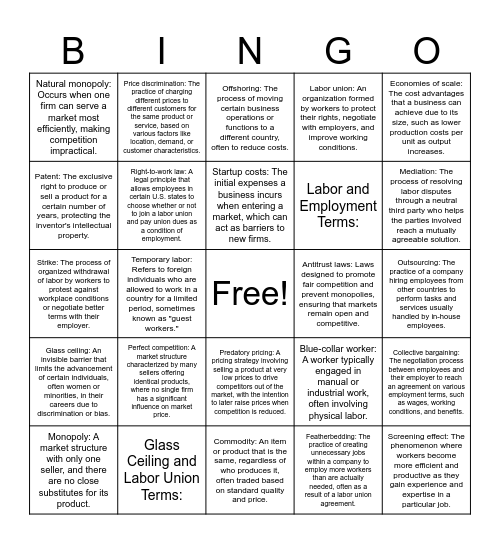

This bingo card has a free space and 25 words: Perfect competition: A market structure characterized by many sellers offering identical products, where no single firm has a significant influence on market price., Commodity: An item or product that is the same, regardless of who produces it, often traded based on standard quality and price., Startup costs: The initial expenses a business incurs when entering a market, which can act as barriers to new firms., Monopoly: A market structure with only one seller, and there are no close substitutes for its product., Economies of scale: The cost advantages that a business can achieve due to its size, such as lower production costs per unit as output increases., Natural monopoly: Occurs when one firm can serve a market most efficiently, making competition impractical., Patent: The exclusive right to produce or sell a product for a certain number of years, protecting the inventor's intellectual property., Price discrimination: The practice of charging different prices to different customers for the same product or service, based on various factors like location, demand, or customer characteristics., Antitrust laws: Laws designed to promote fair competition and prevent monopolies, ensuring that markets remain open and competitive., Predatory pricing: A pricing strategy involving selling a product at very low prices to drive competitors out of the market, with the intention to later raise prices when competition is reduced., Labor and Employment Terms:, Strike: The process of organized withdrawal of labor by workers to protest against workplace conditions or negotiate better terms with their employer., Blue-collar worker: A worker typically engaged in manual or industrial work, often involving physical labor., Collective bargaining: The negotiation process between employees and their employer to reach an agreement on various employment terms, such as wages, working conditions, and benefits., Right-to-work law: A legal principle that allows employees in certain U.S. states to choose whether or not to join a labor union and pay union dues as a condition of employment., White-collar worker: Employees engaged in professional, administrative, or managerial roles., Outsourcing: The practice of a company hiring employees from other countries to perform tasks and services usually handled by in-house employees., Offshoring: The process of moving certain business operations or functions to a different country, often to reduce costs., Mediation: The process of resolving labor disputes through a neutral third party who helps the parties involved reach a mutually agreeable solution., Temporary labor: Refers to foreign individuals who are allowed to work in a country for a limited period, sometimes known as "guest workers.", Screening effect: The phenomenon where workers become more efficient and productive as they gain experience and expertise in a particular job., Glass Ceiling and Labor Union Terms:, Glass ceiling: An invisible barrier that limits the advancement of certain individuals, often women or minorities, in their careers due to discrimination or bias., Labor union: An organization formed by workers to protect their rights, negotiate with employers, and improve working conditions. and Featherbedding: The practice of creating unnecessary jobs within a company to employ more workers than are actually needed, often as a result of a labor union agreement..
Unemployment Bingo | Unit 3: Marketing | Marketing: Objective 1.02 & 3.06 | Supply and Demand | Staffing a Business
Share this URL with your players:
For more control of your online game, create a clone of this card first.
Learn how to conduct a bingo game.
With players vying for a you'll have to call about __ items before someone wins. There's a __% chance that a lucky player would win after calling __ items.
Tip: If you want your game to last longer (on average), add more unique words/images to it.